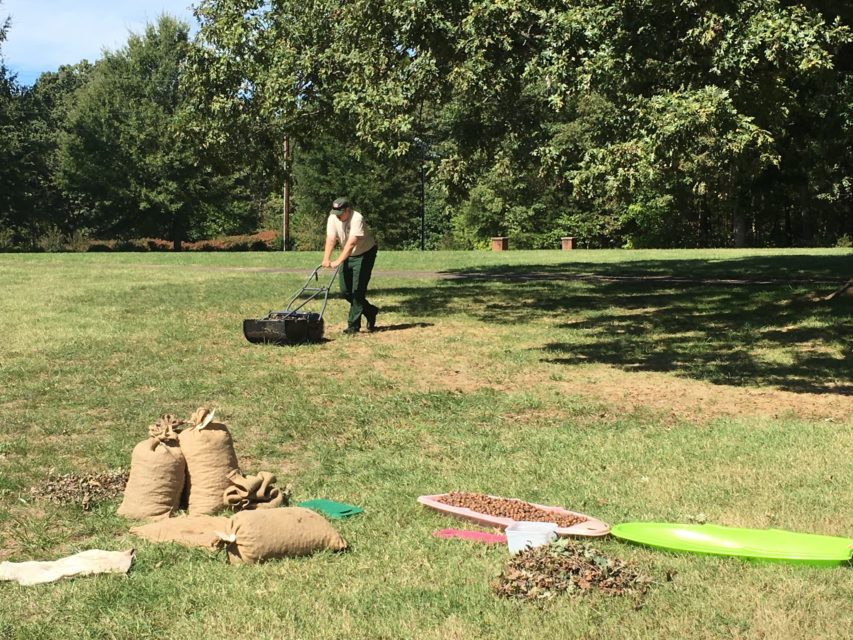Every native tree adds ornamental beauty to the landscape and a vital environmental value to thousands of insects, animals, and creatures. At maturity, one tree can place approximately 20,000 gallons of water into the air daily, muffle noises, produce 260 pounds of oxygen, and remove tons of carbon dioxide gases annually. Unfortunately, according to the USDA Forest Service, the number of trees in North Carolina has lessened due to cutting, thinning, harvesting, and natural disturbances, such as fire and weather events. Advocates of reforestation, our North Carolina Forest Service, offers assistance to homeowners, ensuring trees receive the best chance to reach maturity. Here’s how N.C. Forestry Service can help you!
Forest Development Program
“The Forest Development program is a cost-share program administered by N.C. Forest Service that assists North Carolina landowners with planting trees on cutover land or old field sites intended for timber production,” writes Stokes County Ranger Jonathan Young. “The program provides reimbursement funds to landowners who have received approval. It offsets the cost associated with site preparation, planting, seedling cost, as well as other practices designed to improve existing woodland areas.” For more information on the Forest Development Program, please click http://ncforestservice.gov/Managing_your_forest/fdp.htm.
The cost-share program is one of several available to landowners. To learn more about what programs are available in your area, please contact your local N.C. Forest Service office at https://www.ncforestservice.gov/contacts/contacts_main.htm.
N.C. Tree Nursery
Since 1924, foresters and rangers from one hundred counties in North Carolina collect seeds from our native trees, intended to be grown for the state’s landowners. While most would think about softwood evergreens, oak, and maple trees, the expansive list also names shrubs, native grass plugs, and other types of trees:
- Pollinator varieties: dogwoods, black cherry, the eastern redbud, Chickasaw plum, mulberry, persimmon, and Longleaf Savannah Mix grass, to name a few.
- Beneficial to Wildlife Animals: Sweetgum,11 varieties of oak trees, red maple, Pignut Hickory, and black walnut.
- Conifer Trees: Five varieties of fir, including the Frasier Fir, Carolina Hemlock, short and longleaf pines, red spruce, bald cypress, and Eastern Red Cedar.
- Grasses: Wiregrass, Indian grass, Little Bluestem, and Big Bluestem.
It is the purpose of the native forest tree seedlings to offer a reliable supply of the best genetic selections at an affordable price. In addition, the effect of the Tree Improvement Program results in a better volume of growth, form, disease resistance, and straightness of each native variety. For more information on the Tree Seedling Catalog, please click https://www.ncforestservice.gov/nursery/pdf/NCFS_Tree_Seedling_Catalog.pdf.
N.C. Tree Nursery Services
As a North Carolina resident, you can choose as few as ten seedlings or several thousand to meet an intended goal. The North Carolina Forest Service Tree Seeding Store, www.buynctrees.com, will open to all residents on July 1st, 2022, accepting order forms and payment, including credit card, check, or money order. Container-based seedlings, available for pickup beginning mid-September, and bare-root seedlings, available from December 1st through mid-April, can be collected at your local forest service’s seedling distribution center or shipped directly to your home via UPS. Go to https://nc-forestry.stores.yahoo.net/info.html to find your Seedling Distribution Center pick-up location and additional information.
Continued Forest Service Assistance
One benefit of a Land Management Plan is the continued guidance from foresters, including site preparation, the mapping of areas planted in seedlings, and, if requested, finding planters. Intending to serve North Carolinians, the Forest Service desires the best environment for each tree; therefore, allow their knowledge to help establish a new forest on your property!
For additional information, please go to www.NC.forestryservice.gov.



















